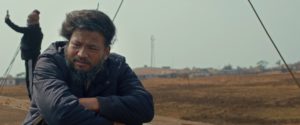 At the prestigious Moscow Film Festival in its 47th edition, celebrated filmmaker, Pradip Kurbah (PK) wins big at the festival where he bags two awards in the categories of Best Director and Best Film for Ha Lyngkha Bneng. Through his crafty style, Kurbah, also a National Award winner, has, through his illustrious path of filmmaking painted lucid images of the state, its people and its culture. With a trail of highly acclaimed creations such as Ri: Homeland of Uncertainty (2013), Onataah: Of the Earth (2016), and Iewduh (2019), Kurbah has done it once again. In a candid conversation with Sunday Shillong (SS), Kurbah takes our readers through an immersive journey of the film and its creative process. Excerpts of the interview:
At the prestigious Moscow Film Festival in its 47th edition, celebrated filmmaker, Pradip Kurbah (PK) wins big at the festival where he bags two awards in the categories of Best Director and Best Film for Ha Lyngkha Bneng. Through his crafty style, Kurbah, also a National Award winner, has, through his illustrious path of filmmaking painted lucid images of the state, its people and its culture. With a trail of highly acclaimed creations such as Ri: Homeland of Uncertainty (2013), Onataah: Of the Earth (2016), and Iewduh (2019), Kurbah has done it once again. In a candid conversation with Sunday Shillong (SS), Kurbah takes our readers through an immersive journey of the film and its creative process. Excerpts of the interview:
 SS: Congratulations on winning Best Director and Best Film at the 47th Moscow Film Festival. How does it make you feel?
SS: Congratulations on winning Best Director and Best Film at the 47th Moscow Film Festival. How does it make you feel?
PK: Thank you so much. Honestly, it’s difficult to put into words what this moment means to me. I’m still taking it all in. It’s overwhelming, deeply humbling, and emotional on many levels. These awards are not just mine; they belong to everyone who believed in this story, stood by it through the years, and gave it life.
For a film made in Khasi, from a small state like Meghalaya, to be recognised on such a grand international platform, it reinforces the idea that local stories, when told sincerely, have the power to resonate globally.
 SS: This accolade places Meghalaya and its filmmaking at the forefront of the international cinematic arena. What are your takeaways?
SS: This accolade places Meghalaya and its filmmaking at the forefront of the international cinematic arena. What are your takeaways?
PK: It gives me deep hope. This moment tells us that our language, our people, our ways of life that they matter. We often carry the fear that our stories are too regional or too quiet to matter on global stages. But this win proves otherwise. It’s a testament to the power of rooted storytelling. This recognition is for the entire cast and team.
SS: What was your vision when making Ha Lyngkha Bneng? How do you think this has resonated with the jury at the film festival?
 PK: My vision was to explore the silence that sits between people and within people. I wanted to capture a world where pain doesn’t always speak loudly, where people carry their grief with quiet dignity. Collaborating with Paulamii helped ground that vision in emotion and structure. We weren’t trying to be profound but we were simply trying to be honest.
PK: My vision was to explore the silence that sits between people and within people. I wanted to capture a world where pain doesn’t always speak loudly, where people carry their grief with quiet dignity. Collaborating with Paulamii helped ground that vision in emotion and structure. We weren’t trying to be profound but we were simply trying to be honest.
The jury, I believe, connected with that sincerity. The film doesn’t follow dramatic peaks. It unfolds gently, like life does in our hills. It allowed them to listen, not just watch.
SS: What has the journey of the film been like?
PK: The journey has been everything—difficult, beautiful, emotional. We started with very little but carried an enormous amount of belief. Every stage from writing, location scouting, casting, production, and editing was a test of patience. And yet, every setback made the film stronger.
SS: What were the other films like in the festival? What did you learn from them?
PK: The films at the festival were stunning—visually, narratively, and emotionally. What I learned is that authenticity always stands out. There was a shared humility across many films; a quiet confidence. I saw how powerful minimalism can be. It reminded me that storytelling is about feeling, not formula.
SS: Why do you think your film stood out in the festival?
PK: With humility, I can only guess. But I think the film’s honesty made it stand out. We never tried to conform. The rootedness in our landscape, our culture, our language was presented with pride but without pretense. The sound design allowed for breath. The cinematography didn’t seek to impress but to observe. I think the stillness of the film created room for introspection, and perhaps that touched the jury.
SS: Your film is set in the year 2047—100 years post Indian Independence. Why do you think that is a landmark year to tell the story of the Khasis?
PK: 2047 is a milestone but also a mirror. It asks us to look at what freedom really means for small communities like ours. For the Khasis, freedom is not just about governance but it’s about retaining culture, values, and togetherness. Urban migration is slowly pulling us away from our roots. We’re losing our villages, our rituals, our communal bonds. I fear that by 2047, if things don’t change, we may become strangers to our own land. That’s why I wanted to create a world where the reverse happens—a rural migration, a return home, a rediscovery of who we are together.
SS: Among the six characters, whom did you resonate the most with and why?
PK: They’re all fragments of me. Each character carries a weight I’ve carried, or seen others carry like loss, guilt, longing, and unspoken love. Maybe that’s why they feel real. I didn’t create them, I discovered them.
There are days I feel like Richard, lost and burdened. Other days, I feel like Maia, silent, observant, and holding pain in the gut. That’s the beauty of ensemble storytelling; it reflects the many selves we carry.
SS: Tell us about your team—co-writer, script, sound. How did you and the team form such homogeneity in your output?
PK: It began with one word; trust. Paulamii and I wrote with care yet never rushing. Pradip Daimary and I spent hours just talking about light and silence before touching the camera. Badeimon brought stillness to the edit, never afraid to hold a moment longer than usual.
Gaido grounded the film in physical reality with his designs. And the sound team comprising Sumir, Saptak, Sayantan didn’t fill scenes with noise, they built textures of silence. We didn’t just make a film. We built a shared emotional language.
SS: What does this moment mean for filmmakers from Meghalaya?
PK: This moment is deeply meaningful and not just for me, but for the entire community of storytellers from Meghalaya. It marks a collective achievement and a significant step forward for cinema from our region.
Filmmakers like Dominic Sangma and Wanphrang Diengdoh continue to be among the most promising voices, shaping and enriching our cinematic identity with their powerful work but there is an emerging generation of filmmakers who are equally inspiring with their fresh perspectives and powerful stories waiting to be told.
SS: When people watch your film, as the director, what would you like them to take for a message?
PK: I don’t want the film to shout a message. I want it to whisper a feeling. If someone finishes the film and sits quietly for a moment, thinking of their roots, their village, their lost ones, I’d feel fulfilled. I want the film to offer that still space for memory, for healing, for quiet understanding.
SS: How would you sum up this experience in one thought?
PK: This journey has been all about faith. There were many moments of doubt when I felt invisible, and I wondered if anyone would care about a story told in Khasi, from Meghalaya. But deep inside, I always believed that our stories matter.
Ha Lyngkha Bneng came from a very personal place. It was born out of silence, from the pain of losing my father, and from the sadness of seeing our traditions slowly fade. This moment is not just about an award—it’s about a collective awakening. It shows that films in languages like Khasi,Garo or Pnar can travel, can connect, can heal. It reminds us that even from the smallest corners, stories can echo across the world. I really hope this is just the start—not only for me, but for every filmmaker in Meghalaya who is dreaming in silence.
As a visionary artist, who has orchestrated aspects of the native people, their struggles and inhibitions, Kurbah has truly lived up to his legacy of being a director and filmmaker of global appeal.
(Interviewed by Esha Chaudhuri)



